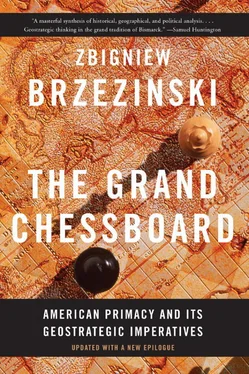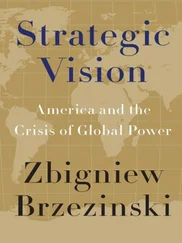Zbigniew Brzezinski
THE GRAND CHESSBOARD
AMERICAN PRIMACY AND ITS GEOSTRATEGIC IMPERATIVES
For my students—to help them shape tomorrow’s world
The Sino-Soviet Bloc and Three Central Strategic Fronts
The Roman Empire at Its Height
The Manchu Empire at Its Height
Approximate Scope of Mongol Imperial Control, 1280
European Global Supremacy, 1900
British Paramountcy, 1860–1914
American Global Supremacy
The World’s Geopolitically Central Continent and Its Vital Peripheries
The Eurasian Chessboard
The Global Zone of Percolating Violence
France’s and Germany’s Geopolitical Orbits of Special Interest
Is This Really “Europe”?
Beyond 2010: The Critical Core of Europe’s Security
Loss of Ideological Control and Imperial Retrenchment
Russian Military Bases in the Former Soviet Space
The Eurasian Balkans
Major Ethnic Groups in Central Asia
The Turkic Ethnolinguistic Zone
The Competitive Interests of Russia, Turkey, and Iran
Caspian-Mediterranean Oil Export Pipelines
Boundary and Territorial Disputes in East Asia
Potential Scope of China’s Sphere of Influence and Collision Points
Overlap Between a Greater China and an American-Japanese Anti-China Coalition
LIST OF CHARTS AND TABLES
The Continents: Area
The Continents: Population
The Continents: GNP
European Organizations
EU Membership: Application to Accession
Demographic Data for the Eurasian Balkans
Asian Armed Forces
INTRODUCTION
Superpower Politics
EVER SINCE THE CONTINENTS started interacting politically, some five hundred years ago, Eurasia has been the center of world power. In different ways, at different times, the peoples inhabiting Eurasia—though mostly those from its Western European periphery—penetrated and dominated the world’s other regions as individual Eurasian states attained the special status and enjoyed the privileges of being the world’s premier powers.
The last decade of the twentieth century has witnessed a tectonic shift in world affairs. For the first time ever, a non-Eurasian power has emerged not only as the key arbiter of Eurasian power relations but also as the world’s paramount power. The defeat and collapse of the Soviet Union was the final step in the rapid ascendance of a Western Hemisphere power, the United States, as the sole and, indeed, the first truly global power.
Eurasia, however, retains its geopolitical importance. Not only is its western periphery—Europe—still the location of much of the world’s political and economic power, but its eastern region—Asia—has lately become a vital center of economic growth and rising political influence. Hence, the issue of how a globally engaged America copes with the complex Eurasian power relationships—and particularly whether it prevents the emergence of a dominant and antagonistic Eurasian power—remains central to America’s capacity to exercise global primacy.
It follows that—in addition to cultivating the various novel dimensions of power (technology, communications, information, as well as trade and finance)—American foreign policy must remain concerned with the geopolitical dimension and must employ its influence in Eurasia in a manner that creates a stable continental equilibrium, with the United States as the political arbiter.
Eurasia is thus the chessboard on which the struggle for global primacy continues to be played, and that struggle involves geostrategy—the strategic management of geopolitical interests. It is noteworthy that as recently as 1940 two aspirants to global power, Adolf Hitler and Joseph Stalin, agreed explicitly (in the secret negotiations of November of that year) that America should be excluded from Eurasia. Each realized that the injection of American power into Eurasia would preclude his ambitions regarding global domination. Each shared the assumption that Eurasia is the center of the world and that he who controls Eurasia controls the world. A half century later, the issue has been redefined: will America’s primacy in Eurasia endure, and to what ends might it be applied?
The ultimate objective of American policy should be benign and visionary: to shape a truly cooperative global community, in keeping with long-range trends and with the fundamental interests of humankind. But in the meantime, it is imperative that no Eurasian challenger emerges, capable of dominating Eurasia and thus also of challenging America. The formulation of a comprehensive and integrated Eurasian geostrategy is therefore the purpose of this book.
Zbigniew Brzezinski Washington, D.C. April 1997
CHAPTER 1
Hegemony of a New Type

HEGEMONY IS AS OLD AS MANKIND. But America’s current global supremacy is distinctive in the rapidity of its emergence, in its global scope, and in the manner of its exercise. In the course of a single century, America has transformed itself—and has also been transformed by international dynamics—from a country relatively isolated in the Western Hemisphere into a power of unprecedented worldwide reach and grasp.
THE SHORT ROAD TO GLOBAL SUPREMACY
The Spanish-American War in 1898 was America’s first overseas war of conquest. It thrust American power far into the Pacific, beyond Hawaii to the Philippines. By the turn of the century, American strategists were already busy developing doctrines for a two-ocean naval supremacy, and the American navy had begun to challenge the notion that Britain “rules the waves.” American claims of a special status as the sole guardian of the Western Hemisphere’s security—proclaimed earlier in the century by the Monroe Doctrine and subsequently justified by America’s alleged “manifest destiny”—were even further enhanced by the construction of the Panama Canal, which facilitated naval domination over both the Atlantic and Pacific Oceans.
The basis for America’s expanding geopolitical ambitions was provided by the rapid industrialization of the country’s economy. By the outbreak of World War I, America’s growing economic might already accounted for about 33 percent of global GNP, which displaced Great Britain as the world’s leading industrial power. This remarkable economic dynamism was fostered by a culture that favored experimentation and innovation. America’s political institutions and free market economy created unprecedented opportunities for ambitious and iconoclastic inventors, who were not inhibited from pursuing their personal dreams by archaic privileges or rigid social hierarchies. In brief, national culture was uniquely congenial to economic growth, and by attracting and quickly assimilating the most talented individuals from abroad, the culture also facilitated the expansion of national power.
World War I provided the first occasion for the massive projection of American military force into Europe. A heretofore relatively isolated power promptly transported several hundred thousand of its troops across the Atlantic—a transoceanic military expedition unprecedented in its size and scope, which signaled the emergence of a new major player in the international arena. Just as important, the war also prompted the first major American diplomatic effort to apply American principles in seeking a solution to Europe’s international problems. Woodrow Wilson’s famous Fourteen Points represented the injection into European geopolitics of American idealism, reinforced by American might. (A decade and a half earlier, the United States had played a leading role in settling a Far Eastern conflict between Russia and Japan, thereby also asserting its growing international stature.) The fusion of American idealism and American power thus made itself fully felt on the world scene.
Читать дальше














